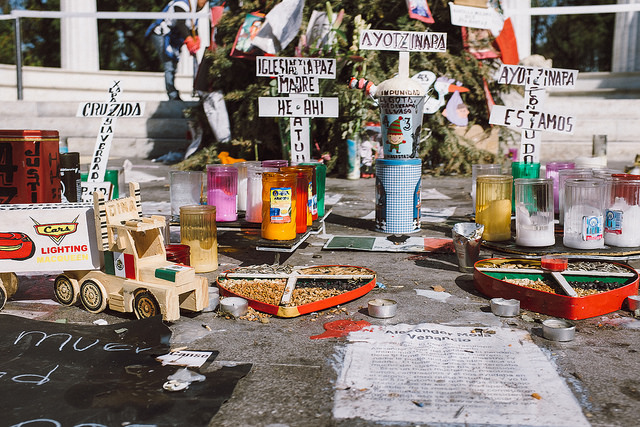
A memorial for the 43 Ayotzinapa college students disappeared by municipal police in Iguala. Owen Lin/Flickr
The U.S. must address the flow of legal weaponry to Mexico—weapons that too often are used against Mexicans and migrants.
Last month, more details came to light in the disappearance of 43 student teachers from Ayotozinapa, Guerrero. The students were in the city of Iguala one night in September 2014 when they were seized—and disappeared—by municipal police.
Documents from the Mexican defense ministry’s arms registry list the weapons possessed by the Iguala municipal police at the time. Among the arms listed: 20 assault rifles produced by Colt’s Manufacturing, headquartered in Hartford, Connecticut. Colt sold the government those rifles, which arrived in Iguala in 2013.

The Ayotzinapa case has become a linchpin for national and international criticism of the Mexican government. U.S. policymakers are becoming increasingly skeptical about assistance to Mexican police and military forces, as the government under President Enrique Peña Nieto has stonewalled investigations into this case and other human rights violations.
But policymakers should also apply that skepticism to stem the massive flow of legal weaponry—through grant assistance and official arms sales—from the U.S. to Mexican police and military forces.
Last month, the Interdisciplinary Group of Independent Experts (GIEI)—established by the Inter-American Human Rights Commission to investigate the disappearances—released a report that pointed to torture of at least 17 people detained in the case. These were people whose testimony formed the basis of the government’s official account of events, which GIEI had earlier disproved.
A United Nations group of human rights experts said the GIEI report shows “serious deficiencies in the justice system, a worrying weakness of the State to investigate with due diligence gross human rights violations, and the sophisticated level of coordination of some authorities in the commission of crimes.”
After GIEI released the report, the Mexican government declined to renew the group’s mandate to continue its investigation and remained silent in the face of a vicious media campaign against the group’s members. On April 26, thousands of people—led by families of those Ayotzinapa students—protested the decision in Mexico City.
In the U.S., Senate officials are expected to demand that the U.S. State Department withhold nearly $20 million from counter-drug assistance to Mexico, because of the country’s rejection of human rights concerns. The move would follow an unprecedented cut in military aid to Mexico last year.
But so far, policymakers in Washington have not called for a reduction in official U.S. arms sales to the Mexican police and military, which has amounted to more than $3.5 billion since 2012.
 The Ayotzinapa case is only the most prominent of serious atrocities of military and police violations that remain in impunity. The 43 college students are among more than 25,000 people reported disappeared in Mexico. Freedom House called Mexico an “unfree country” for journalists for the fifth year in a row, and denounced persecution of human rights activists in the country. The annual human rights report of the State Department observed that “impunity and corruption in the law enforcement and justice system remained serious problems,” with police and the military involved in “unlawful killings, torture, and disappearances.”
The Ayotzinapa case is only the most prominent of serious atrocities of military and police violations that remain in impunity. The 43 college students are among more than 25,000 people reported disappeared in Mexico. Freedom House called Mexico an “unfree country” for journalists for the fifth year in a row, and denounced persecution of human rights activists in the country. The annual human rights report of the State Department observed that “impunity and corruption in the law enforcement and justice system remained serious problems,” with police and the military involved in “unlawful killings, torture, and disappearances.”
While Washington has steadily reduced military and police assistance to Mexico, U.S. arms sales to the country have risen in recent years. And since 2006, homicide rates in Mexico have climbed with the increase in arm sales from the U.S. (see our infographic).
GIEI said that their work “was born out of a wound” felt by the family members of the Ayotzinapa students who were disappeared. AFSC is responding to that wound and seeking ways to address the flow of weapons that too often are used against Mexicans and migrants.
Next month, an AFSC delegation to Mexico will meet with family members of those impacted by imported weapons and Mexican and U.S. officials. In the coming months, we’ll share with you more information on how U.S. policies are fueling violence against Mexicans and Central American migrants—and keep you up to date on how to help protect human rights in Mexico.
For more, visit AFSC’s Stop U.S.-Fueled Violence in Mexico.